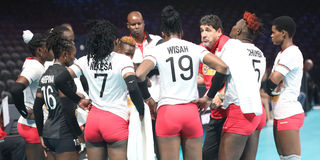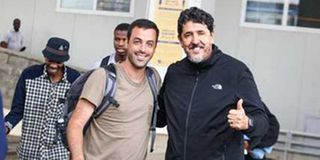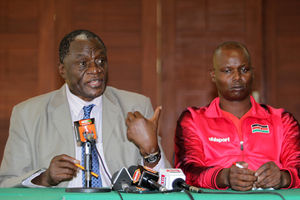
National Olympic Committee of Kenya President Paul Tergat with FIVB's Head of Technical and Development Department Fabio Azevedo at the FIVB headquarters in Lausanne, Switzerland, on May 23, 2023.
Coming in an Olympics year, the decision by the Kenya Volleyball Federation (KVF) to opt out of Sh88 million technical support programme from the Fédération Internationale de Volleyball, commonly known by the acronym FIVB, has sent a shockwaves in the local sports fraternity.
The FIVB Volleyball Empowerment was a part of FIVB President Dr Ary Graça’s Nucleus plan, to mark a new era of volleyball development around the world.
The Sh88 million International Volleyball Federation (FIVB) Volleyball Empowerment Programme was meant to sharpen Kenya’s national teams, especially the Africa champions, “Malkia Strikers”, ahead of major global competitions. Next in line for the national women’s team is the Olympic Games tournament in Paris from July 26 to August 11.
The FIVB Volleyball Empowerment Programme was a part of FIVB President Ary Graca’s “Nucleus Plan” aimed at marking a new era of volleyball development around the world. It was meant to empower and improve the technical level of national teams and athletes in order to provide them with the skills to play at the highest level, reach their full potential and achieve their goals.

Kenya coach Luizomar de Moura talks to his players in a timeout during their FIVB World Championships Pool 'A' match against Belgium at Gelredome arena in Arnhem, Netherlands on September 25, 2022.
The FIVB had seconded six coaches to Malkia Strikers as part of targeted support to improve performance and change global perception of African women’s volleyball on the global stage. Through the programme, the FIVB had invested close to 600,000 Swiss Francs (Sh88 million) in Malkia Strikers since its preparations for the delayed Tokyo Olympic Games. The six coaches assigned to the national women’s team were Luizomar de Moura (head coach), Jefferson Arosti (assistant coach), Marcelo De Souza (strength and conditioning coach), Leonard Barbos (statistician), Thiago Lessa Moreira (physiotherapist) and Roberto Opice Neto (team manager). The six coaches, together with KVF Deputy President Paul Bitok (then an assistant coach), were in charge as Malkia Strikers competed in the 2023 FIVB Volleyball Challenger Cup (France), 2022 FIVB World Championship (Netherlands), 2023 Africa Nations Championship (Cameroon) and the delayed Tokyo 2020 Olympics.
But early this year, KVF demanded “equal representation” on the technical bench during the Paris 2024 Olympic Games, pushing for at least three local coaches to work alongside three Brazilian coaches. As part of the FIVB programme, Malkia Strikers would also have camped in Finland for a month-long residential training in preparation for the Paris Olympics.
FIVB, however, stood its ground, offering two positions for local coaches, a proposal that was rejected by KVF’s National Executive Committee. KVF thus failed to sign the Memorandum of Understanding (MoU) to continue the partnership and FIVB, in a statement published on their website on April 25, chose to respect their decision.
The bungled technical assistance programme was conceived in 2020, and started in 2021 just before the delayed 2020 Olympics. Egypt’s men’s volleyball team joined the programme last year.
FIVB picked Egypt and Kenya for the two-year renewable contract as the two nations had made tremendous improvement in performance. In 2019 when the late Waithaka Kioni approached FIVB in his capacity as KVF President to discuss the programme, the world body asked him to choose between a technical empowerment programme, and support through provision equipment (balls and nets). Kioni settled for the former and negotiated for two Kenyan coaches to understudy the Brazilians. Paul Bitok, then head coach, and assistant coach Josp Barasa accompanied the team to Tokyo.
The technical package entailed payment of player allowances, facilitation of international training camps, payment of FIVB coaches and two Kenyan coaches, and payment of accommodation and travel costs for the playing unit and coaches.
“We can always get equipment but just look at what the technical approach has on offer. Who wouldn’t have picked the offer? when Kioni took the offer, I think that was the end of Malkia Strikers’ struggles in getting exposure, allowances, among other shortcomings that the team had previously faced,” a source who preferred anonymity for fear of victimisation told Nation Sport.
“So Sh88 million disbursement by FIVB was done in phases, but no money hit KVF’s account to the best of my knowledge. FIVB had the offer for two Kenyan coaches to be part of the technical bench, something that Kioni agreed to. That was a fair deal. It’s unfortunate that KVF has discontinued the programme. They would have let the programme to run, and renegotiate it for better representation. The FIVB was ready and willing to renew that deal that might have extended to the men’s team,” the source added.
The source intimated that FIVB may sanction KVF after the federation failed to pay FIVB money that losers of matches at the World Grand Prix Group Two and the Nations League Challenger Cup are mandated to pay. Kenya lost all its matches at the 2015 World Grand Prix Group Two, and at the 2016 Nations League Challenger Cup.
“In 2015, Malkia Strikers qualified for World Grand Prix Two competition, having won World Grand Prix Three in Australia. Winners were paid millions of shillings, and when you lost a match, you were to part with some money. I remember Kenya lost all its three matches - against Bulgaria, Argentina and the Domican Republic - and the federation was to pay FIVB but Kioni had a gentleman’s agreement with them, and they waived the money. The federation didn’t pay. What happens if they decide to pursue the case, I’m not sure if the current office has the money to pay,” the source added.
A member of KVF’s executive committee who also spoke on condition of anonymity said that unlike the previous deal in which Kioni forced the empowerment programme arrangement down their throats, this time round they wanted a proper breakdown of the programme, something the source said did not go down well with FIVB.
Sh88 million
“It might be true that the FIVB released Sh88 million, but it never reflected in the federation’s account. I can’t tell whether it benefitted few individuals at the time. When the late Kioni brought the deal, they had already agreed and signed it, and we really didn’t know what was on offer. We didn’t have options but to go with the flow. But the script was different this time round when the programme came up for renewal. We wanted a better understanding of the package, what was at stake, what was in the store for the country, fair representation of the technical bench, among other things. We wanted 50/50 representation in the technical bench, but the Brazillians were only keen on giving out one slot, and they were to pick the official. Again, FIVB did not pay our players allowances, save for funding training camp, and buying air tickets. This didn’t sit well with the executives and that’s why we abandoned the deal. We felt our coaches were not benefitting or learning from the FIVB coaches,” the official said.

Malkia Strikers’ Brazilian coach Luizomar de Moura (left) and team manager Roberto “Beto” Opice Neto when they Landed at Jomo Kenyatta International Airport on May 25, 2025.
While announcing the termination of the deal on April 25, FIVB said in a statement: “The FIVB, respecting the decision of the Kenya Volleyball Federation (KVF) leadership, has agreed not to continue with the targeted support Volleyball Empowerment investment for the six-member coaching team of the Kenya women’s national team. One of the fundamental principles of the Volleyball Empowerment programme is to help National Federations achieve independence and self-sustainability. The FIVB therefore commends the KVF’s intention and resolve to grow its technical capacity and exposure with the aim of becoming self-sustainable. The FIVB is delighted that the investment has elevated the team to new heights and allowed the national federation to grow and foster new talent. The FIVB remains supportive of the national federation’s development goals and will continue to offer assistance and work collaboratively with the KVF to develop the sport of volleyball and inspire a new generation of players and fans.”
It remains to be seen the plans KVF have for Malkia Strikers ahead of the Paris 2024 Olympics, where they will be Africa’s sole representatives. The team’s performance has declined, having recently lost the African Games title to rivals Egypt in March this year. In January, Egypt beat Kenya twice during the Zone Five qualifiers for the African Games. Egypt eliminated Kenya in the semi-finals of the tournament held in Accra. The team is expected to start preparing for the Olympics mid-May after completion of the KVF National League end-of-season play-offs.









